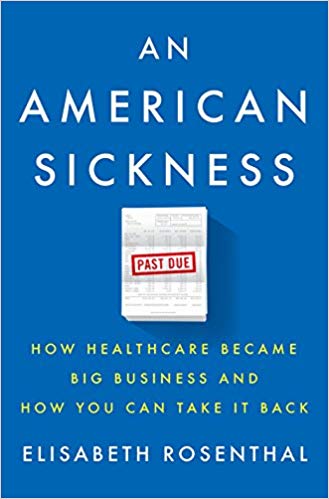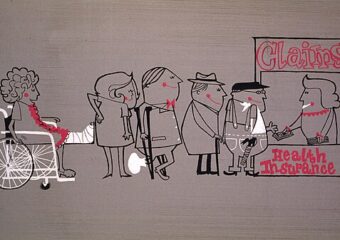Elisabeth Rosenthal
Penguin Press
New York, NY
2017
406 pages
According to the Art:
The book examines several components of American health care to isolate specific causes for the financial toxicity people are experiencing, and offers ideas to help health care consumers, providers, policy experts, and legislators.
Synopsis:
The title of this book, “An American Sickness,” refers to the author’s view that the costs people who require health care must bear in the U.S. causes its own sickness. The author, Elisabeth Rosenthal, is a physician-turned-journalist, so her use of a medical metaphor to explain the harms health care costs are causing people comes naturally to her. The sickness metaphor forms the structure for the entire book, and in particular the way a physician approaches a patient with a health problem to diagnose and treat. Thus, the introduction to the book is the “chief complaint,” Part I is the “history of present illness and review of systems,” and Part II is “diagnosis and treatment.”
The chief complaint is: “hugely expensive medical care that doesn’t reliably deliver quality results.” (p. 4) This complaint is also relatively acute given that the financial toxicity health care causes has become so extreme over just the twenty-five-year period starting in the early 1990s. This was the time it took in Rosenthal’s view for American medicine to transform from a “caring endeavor to the most profitable industry in the United States.” (p. 4)
The source of this complaint cannot be located in one segment of society or in one part of health care in the U.S. It’s diffuse. Therefore, Rosenthal examines several components of American health care to isolate specific causes for the financial toxicity people are experiencing—her review of systems. She examines eleven particular components, with each one comprising a separate chapter as follows: insurance; hospitals; physicians; pharmaceuticals; medical devices; testing and ancillary services; contractors; research; conglomerates; health care as businesses; and the Affordable Care Act.
Part II on diagnosis and treatment takes the form of a how-to book, as the book’s subtitle announces. Rosenthal is speaking to health care consumers—all of us, that is—and commanding our attention: “The American healthcare system is rigged against you. It’s a crapshoot and from day to day, no one knows if it will work well to address a particular ailment.” (p. 241) After a chapter on the consequences of being complacent with our personal health care utilization and costs, Rosenthal provides advice in subsequent chapters on these topics: doctor’s bills; hospital bills; insurance costs; drug and medical device costs; bills for tests and ancillary services; and managing all this in a digital age.
The book is replete with case studies. The writing is geared toward health care consumers who have no expertise in any aspect of health care—it is Rosenthal the health care journalist writing, not Rosenthal the physician and health policy expert.
Analysis:
Health care consumers will benefit from this book in two particular ways. One is that there are clear explanations for what is driving costs and what consumers can do to reduce the risk of catastrophic financial consequences. The other is conveying to them that for all the attention paid to the health care cost crisis and the hysteria attached to it, the situation is actually worse. Rosenthal is suggesting—implicitly and explicitly—that Americans will need to mobilize in force to effect the needed changes.
Health care professionals who are busy taking care of people during most of their days will benefit as well. While they are generally aware of the challenges people face with costs, and with their own problems getting reimbursement, they will get a better understanding of the mechanisms involved.
Health care policy experts will not learn much from the content covered in the book. The book is neither deep nor technical. But the book does offer health policy experts a compilation of causes driving the health care cost crisis, and as a compilation, it brings added force to Rosenthal’s argument that serious action is needed now.
Legislators will benefit in a similar way, but Rosenthal wasn’t talking to just them. If she were, she might have gone with a different metaphor, and that of a fire. Each of Rosenthal’s eleven chapters on individual causes of the cost crisis can look like a one-bell fire easily contained. But, as a complication of causes, it looks more like an one-bell fire that needs all available resources before a whole city is rapidly burned to the ground.
Also:
A companion book that explores transformations in health care delivery and that was published about the same time as this book is: Prescription for The Future: The Twelve Transformational Practices of Highly Effective Medical Organizations by Ezekiel Emanuel, A review is available here.
A version of this review is posted at the NYU Literature, Arts and Medicine Database.



